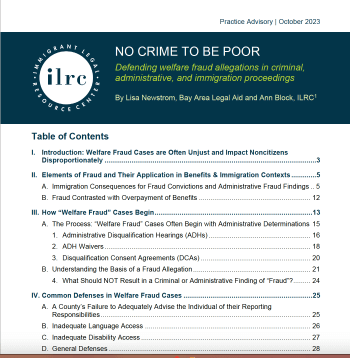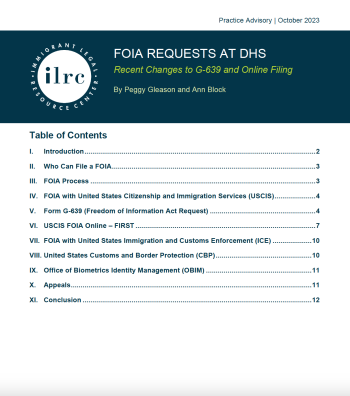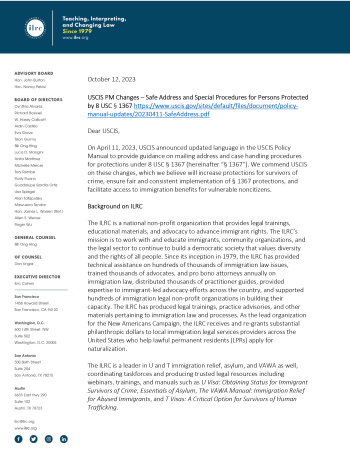
The ILRC commented on USCIS policy guidance regarding Safe Address and Special Procedures for Persons Protected by 8 USC 1367. ILRC commends USCIS for this guidance and provides suggestions for further strengthening the guidance.
On May 11, 2023, the Biden administration issued a new regulation creating a bar to asylum for people arriving at the southern U.S. border with certain narrow exceptions. Although there is an ongoing court challenge, the bar, known as the “lawful pathways” rule, remains in effect. This Community Alert explores the exceptions to the bar with a focus on some of the exceptions that apply to children and youth traveling with their families.
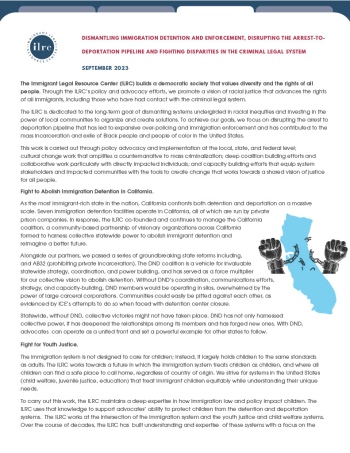
The Immigrant Legal Resource Center (ILRC) builds a democratic society that values diversity and the rights of all people. Through the ILRC’s policy and advocacy efforts, we promote a vision of racial justice that advances the rights of all immigrants, including those who have had contact with the criminal legal system.
The ILRC is dedicated to the long-term goal of dismantling systems undergirded in racial inequities and investing in the power of local communities to organize and create solutions. To achieve our goals, we focus on disrupting the arrest to deportation pipeline that has led to expansive over-policing and immigration enforcement and has contributed to the mass incarceration and exile of Black people and people of color in the United States.
This work is carried out through policy advocacy and implementation at the local, state, and federal level; cultural change work that amplifies a counternarrative to mass criminalization; deep coalition building efforts and collaborative work particularly with directly impacted individuals; and capacity building efforts that equip system stakeholders and impacted communities with the tools to create change that works towards a shared vision of justice for all people
The ILRC is dedicated to the long-term goal of dismantling systems undergirded in racial inequities and investing in the power of local communities to organize and create solutions. To achieve our goals, we focus on disrupting the arrest to deportation pipeline that has led to expansive over-policing and immigration enforcement and has contributed to the mass incarceration and exile of Black people and people of color in the United States.
This work is carried out through policy advocacy and implementation at the local, state, and federal level; cultural change work that amplifies a counternarrative to mass criminalization; deep coalition building efforts and collaborative work particularly with directly impacted individuals; and capacity building efforts that equip system stakeholders and impacted communities with the tools to create change that works towards a shared vision of justice for all people
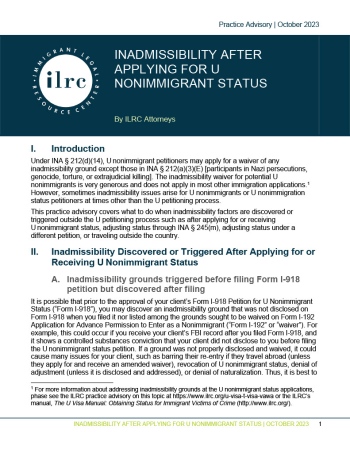
This practice advisory covers what to do when inadmissibility factors are discovered or triggered outside the U petitioning process such as after applying for or receiving U nonimmigrant status, adjusting status through INA § 245(m), adjusting status under a different petition, or traveling outside the country.
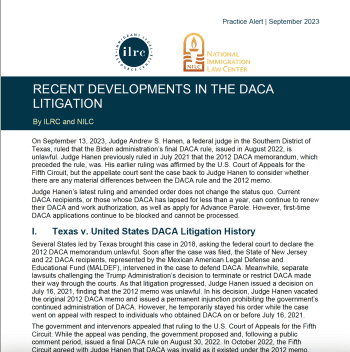
On September 13, 2023, Judge Andrew S. Hanen, a federal judge in the Southern District of Texas, ruled that the Biden administration’s final DACA rule, issued in August 2022, is unlawful. Judge Hanen previously ruled in July 2021 that the 2012 DACA memorandum, which preceded the rule, was. His earlier ruling was affirmed by the U.S. Court of Appeals for the Fifth Circuit, but the appellate court sent the case back to Judge Hanen to consider whether there are any material differences between the DACA rule and the 2012 memo.
This Practice Alert goes over Judge Hanen’s latest ruling. It’s important to note that the amended order does not change the status quo. Current DACA recipients, or those whose DACA has lapsed for less than a year, can continue to renew their DACA and work authorization, as well as apply for Advance Parole. However, first-time DACA applications continue to be blocked and cannot be processed.
This Practice Alert goes over Judge Hanen’s latest ruling. It’s important to note that the amended order does not change the status quo. Current DACA recipients, or those whose DACA has lapsed for less than a year, can continue to renew their DACA and work authorization, as well as apply for Advance Parole. However, first-time DACA applications continue to be blocked and cannot be processed.
On September 13, 2023, a Federal District Court in Texas issued a ruling in Texas v. United States declaring that the Deferred Action for Childhood Arrivals (DACA) rule is unlawful. It is important to note that while this judge once again found DACA to be unlawful, the decision does not change the current status of who is eligible to apply. This Community Alert walks through the details, as of September 18, 2023.
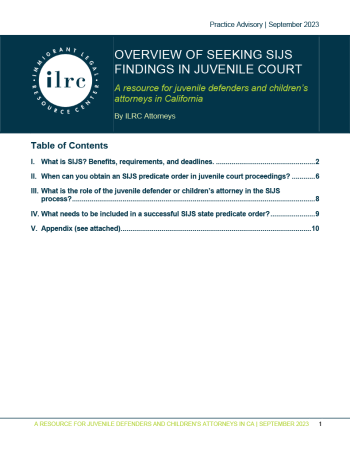
This advisory provides basic information on how to obtain the SIJS predicate order in juvenile court. It describes the benefits, requirements, and deadlines associated with SIJS, and discusses the role of the juvenile defense or children’s attorney in the process. It includes a sample SIJS predicate order from juvenile justice proceedings.
In December 2022 USCIS announced that it was starting a pilot project to redesign the English/civics test for naturalization. If the pilot test is adopted, applicants will face a more difficult English/civics exam. This community explainer breaks down some of those challenges, and how advocates can push for a more inclusive process of naturalization.
